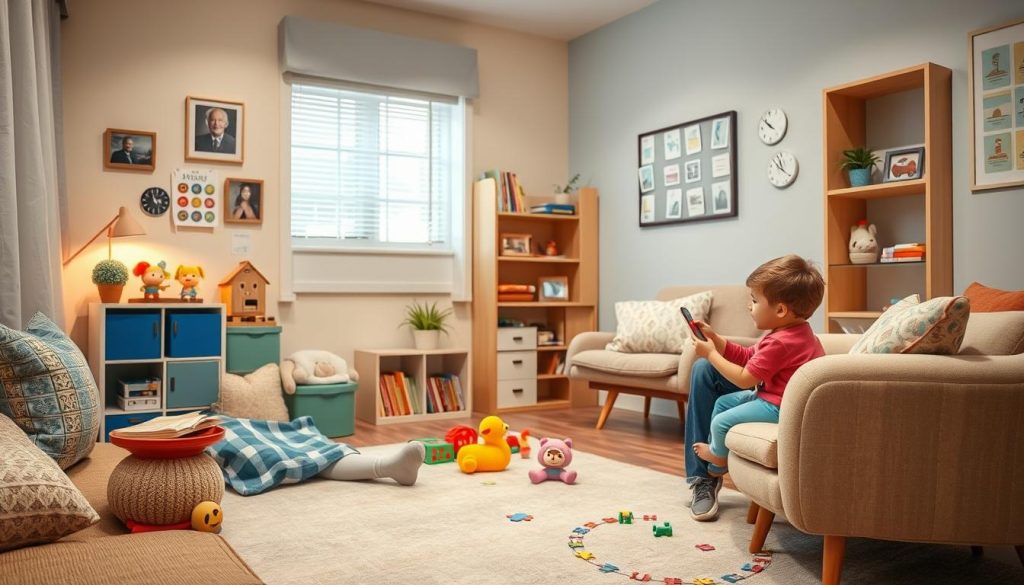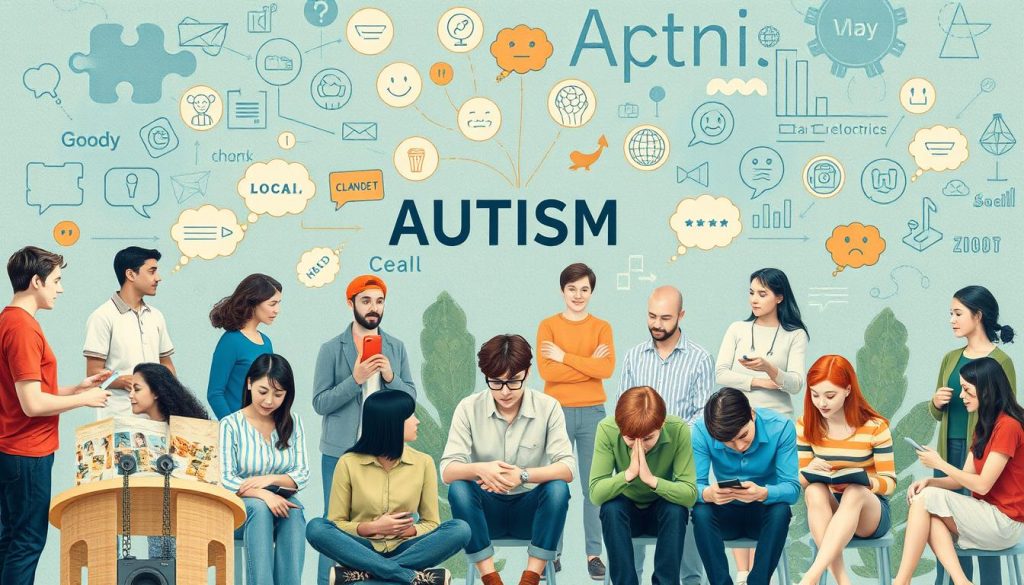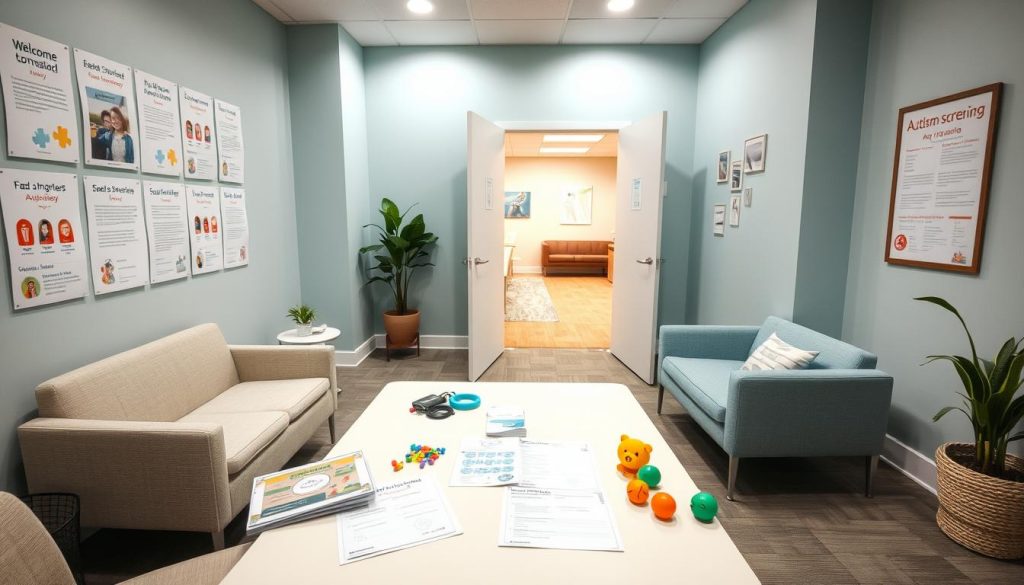Getting a correct autism spectrum disorder diagnosis is key for families seeking answers. Qualified autism diagnosticians are vital in identifying this condition. They use their skills to spot signs of autism and offer the right support.
Autism changes how people interact and learn. That’s why it’s important to get help from healthcare pros who know what to look for. They can tell the difference between autism and other issues that may seem alike at first glance.
In this guide, we’ll explore who can make an autism diagnosis. We’ll also learn why it matters to get help from the right experts. Let’s dive in and find out more about this vital step in understanding autism.
Understanding the Importance of Professional Autism Diagnosis
Getting a professional autism diagnosis is key for those on the spectrum. It involves expert checks to spot unique challenges and strengths. Early diagnosis can change a person’s life, opening doors to special help and support.
Why Proper Diagnosis Matters
Getting it right is the first step to good support. It helps families and individuals grasp behaviors, communication, and sensory issues. A proper diagnosis also means access to special services and legal rights.
Impact on Treatment Planning
After diagnosis, people can get specific therapies. These might include:
- Speech and language therapy
- Occupational therapy
- Behavioral interventions
- Social skills training
Starting early can lead to better results.
Role in Educational Support
An autism diagnosis can unlock school resources. Schools can make special plans for each student. This helps students do well in school and with friends.
| Aspect | With Early Diagnosis | Without Early Diagnosis |
|---|---|---|
| Intervention Start | As early as 18 months | Often delayed until school age |
| Support Services | Immediate access | Limited or delayed access |
| Educational Planning | Tailored from preschool | Reactive adjustments later |
| Family Preparedness | Early education and coping strategies | Potential stress and confusion |
Who Can Diagnose Autism: Qualified Healthcare Professionals

Autism diagnosis needs the skills of many healthcare experts. These specialists work together to give a full evaluation. It’s important for parents to know who can diagnose autism to understand their child’s development.
Pediatricians are often the first to see a child. They do initial screenings and might send families to specialists for more checks. Developmental pediatricians have special training to spot developmental disorders like autism spectrum disorder (ASD).
Child psychologists are key in autism diagnosis. They do detailed tests of a child’s behavior and thinking. They check how well a child talks and interacts with others.
Neurologists look at how the brain works and grows. They might do tests to see if other conditions are causing symptoms that look like autism. Speech-language pathologists check how well a child talks and understands language, which is often affected by ASD.
- Pediatricians
- Developmental pediatricians
- Child psychologists
- Neurologists
- Speech-language pathologists
Occupational therapists look at how well a child processes sensory information and moves. These skills are important for daily life for people with autism. Psychiatrists might be involved, too, for older kids or adults, or if there are other mental health issues.
It’s important to remember, a team of experts works together for an autism diagnosis. Their skills together mean a thorough check and a correct diagnosis. Finding out early and getting help early can make a big difference for those on the autism spectrum.
Developmental Pediatricians and Their Role in Autism Diagnosis
Developmental pediatricians are key in diagnosing autism in kids. They specialize in developmental disorders. This makes them essential in the autism diagnosis process.
Specialized Training and Expertise
These doctors get a lot of training to spot autism early. They know all about child development and can see signs of autism. This skill helps them give accurate diagnoses and treatment plans.
Assessment Methods Used
Developmental pediatricians use many tools to diagnose autism. These include:
- Standardized developmental screenings
- Behavioral observations
- Parent interviews
- Cognitive and language evaluations
These methods help them understand a child’s development fully.
Follow-up Care Coordination
After diagnosing autism, these doctors help with ongoing care. They work with families to make treatment plans. This might include speech therapy, occupational therapy, or behavioral help. This support ensures kids get care that fits their needs.
Child Psychologists and Autism Spectrum Evaluations
Child psychologists are key in diagnosing autism. They use special methods to check a child’s behavior, thinking, and social skills. Their knowledge helps spot autism signs and points families to the right help.

Child psychologists use many tools during an autism diagnosis. They might use tests, watch the child, and talk to the parents. They aim to understand the child’s growth and how they act in different places.
A typical evaluation includes:
- Initial consultation with parents
- Behavioral observations
- Cognitive and language assessments
- Social skills evaluation
- Sensory processing assessment
Child psychologists work with others for a complete diagnosis. This team effort ensures a detailed evaluation and specific treatment plans.
| Assessment Area | Tools Used | Purpose |
|---|---|---|
| Cognitive Abilities | IQ tests, problem-solving tasks | Assess intellectual functioning |
| Language Skills | Speech samples, comprehension tests | Evaluate communication abilities |
| Social Interaction | Observation, role-play scenarios | Assess social understanding and skills |
| Adaptive Functioning | Parent questionnaires, daily living skills assessment | Evaluate independence in everyday tasks |
Child psychologists use detailed methods to help diagnose autism. Their work gives a clear view of a child’s abilities and challenges. This helps in making effective treatment plans.
The Role of Child Psychiatrists in Autism Diagnosis
Child psychiatrists are key in diagnosing autism. They bring special skills to the team. This helps in finding the right treatment for kids with autism.
Diagnostic Approach
Child psychiatrists use a detailed method to check for autism. They talk to parents, watch the child’s actions, and look at their health history. They might also use special tests to learn about the child’s social and communication skills.
Treatment Planning
After finding out if a child has autism, psychiatrists help plan their treatment. They think about what the child can do well and what they struggle with. They suggest therapies and treatments that fit the child’s needs.
Ongoing Care Management
Child psychiatrists also help with ongoing care for kids with autism. They keep an eye on how the child is doing and change the treatment plan if needed. They also help with any other mental health issues the child might have.
It’s important for parents to know who can diagnose autism. Child psychiatrists, along with other experts, are essential in helping kids with autism. They offer support and guidance every step of the way.
Speech-Language Pathologists in the Diagnostic Process

Speech-language pathologists are key in diagnosing autism. They check how well people communicate, which is often different in those with autism. They look for signs of autism needing a diagnosis in language and social skills.
When checking for autism, these experts focus on:
- Receptive language skills
- Expressive language abilities
- Pragmatic language use
- Non-verbal communication
They use tests, observations, and talks with parents to understand a child’s communication. This helps tell autism apart from other issues.
Their work is very important. They find out what language and communication problems a person has. This helps make plans to help them better in daily life and with others.
Occupational Therapists and Sensory Assessment
Occupational therapists are key in diagnosing autism. They check how a child handles sensory input, motor skills, and daily tasks. These checks are important for diagnosing autism.
Sensory Processing Evaluation
Occupational therapists see how a child reacts to touch, sound, and sight. They look for signs of sensory sensitivities, common in autism.
Motor Skills Assessment
They check fine and gross motor skills. This includes how well a child writes or runs. It shows their coordination and dexterity.
Daily Living Skills Analysis
They also look at daily tasks like dressing and eating. This helps see how independent a child is.
| Assessment Area | Skills Evaluated | Relevance to Autism Diagnosis |
|---|---|---|
| Sensory Processing | Reaction to touch, sound, light | Identifies sensory sensitivities |
| Motor Skills | Writing, running, object manipulation | Assesses coordination and dexterity |
| Daily Living | Dressing, eating, hygiene | Evaluates independence and self-care |
Occupational therapists give important insights for diagnosing autism. Their detailed assessments help understand a child’s strengths and challenges.
The Diagnostic Process: What to Expect

An autism diagnostic evaluation is a detailed process. It involves several steps and experts. Professionals start by looking at your child’s medical history and developmental milestones. This helps spot signs of autism spectrum disorder.
Your child will go through different tests during the evaluation:
- Cognitive tests to measure intellectual abilities
- Language and communication evaluations
- Behavioral observations in different settings
- Sensory processing assessments
The evaluation often involves a team of experts. You might meet with a developmental pediatrician, child psychologist, speech therapist, and occupational therapist. Each brings their own skills to the process.
Parents are key in the evaluation. You’ll share details about your child’s behavior, development, and daily life. This information is very important for the professionals to make an accurate diagnosis.
The goal is to understand your child’s strengths and challenges. This knowledge helps create personalized treatment plans. It ensures your child gets the best support.
Early Signs That Warrant Professional Evaluation
It’s important to spot signs of autism early for the best help. Parents and caregivers should watch for certain behaviors and signs. These can show if a child might need an early autism diagnosis.
Behavioral Indicators
Children with autism may act differently. They might repeat actions, focus too much on certain things, or react strangely to sounds or touch. Look for signs like hand-flapping, rocking, or being very sensitive to sounds or textures.
Developmental Milestones
Missing or delayed milestones can be a warning. Keep an eye out for:
- Limited or no babbling by 12 months
- No single words by 16 months
- No two-word phrases by 24 months
- Loss of language or social skills
If you see these signs, it’s time to get a professional’s opinion. They can help with an early autism diagnosis.
Social Communication Concerns
Autism can make it hard for kids to connect with others. Watch for:
- Limited eye contact
- Difficulty understanding or using gestures
- Lack of interest in peers
- Challenges in sharing enjoyment or achievements with others
These signs are important for spotting autism early. If you see these behaviors often, talk to a healthcare provider. They can do a full check-up.
Understanding Diagnostic Criteria for Autism
Autism spectrum disorder diagnosis follows specific criteria set by medical experts. These guidelines help doctors identify and assess individuals who may have autism. The criteria focus on two main areas: social communication and restricted, repetitive behaviors.

Doctors look at how a person interacts with others for social communication. This includes starting and maintaining conversations, sharing emotions, and understanding social cues. They also observe nonverbal communication skills like eye contact and body language.
Restricted and repetitive behaviors are the second part of the criteria. These may include repetitive movements, strict routines, or intense interests in specific topics. Sensory sensitivities, such as being overly sensitive to sounds or textures, are also considered.
| Social Communication | Restricted, Repetitive Behaviors |
|---|---|
| Difficulty with back-and-forth conversation | Repetitive movements or speech |
| Challenges in nonverbal communication | Inflexible adherence to routines |
| Trouble developing and maintaining relationships | Highly restricted interests |
| Limited sharing of interests or emotions | Unusual sensory responses |
To receive an autism spectrum disorder diagnosis, a person must show signs in both areas. These symptoms must be present from early childhood and impact daily functioning. Healthcare providers use various tools and observations to assess these criteria and make an accurate diagnosis.
Insurance Coverage and Autism Diagnosis
It’s key for families to know about insurance for autism tests. Getting a diagnosis can cost a lot, but there are ways to manage it. Knowing your options can help.
Private Insurance Options
Many private insurance plans cover autism tests. Check your policy for what’s covered and who you can see. Some plans need a doctor’s okay or a referral first.
Medicaid Coverage
Medicaid often covers autism tests fully. But, what’s covered and who’s eligible can change by state. Always call your local Medicaid to find out the details.
Out-of-Pocket Considerations
Even with insurance, you might have to pay some money yourself. This could be for copays, deductibles, or services not covered. Talk to your doctor about what you might have to pay before the test.
| Coverage Type | Typical Inclusions | Potential Limitations |
|---|---|---|
| Private Insurance | Diagnostic evaluations, some therapy services | Annual caps, network restrictions |
| Medicaid | Comprehensive evaluations, ongoing therapies | Provider availability, state-specific rules |
| Out-of-Pocket | Flexible provider choice, immediate access | Higher costs, no insurance reimbursement |
Always look into all your options and talk to your insurance company. This way, you’ll know what’s covered for autism tests. This helps you choose the right doctor for your child’s needs.
Finding Qualified Autism Diagnosticians Near You
Finding a qualified autism diagnostician near you is key to getting a correct diagnosis. Begin by asking your child’s pediatrician for suggestions. They often know autism diagnosis experts and can help you find reliable ones.
Online directories are also great resources. The Autism Society and Autism Speaks have databases of autism diagnosticians. You can search by location, specialty, and insurance coverage.
Local autism support groups can also give personal tips. Parents who have been through the process can share their experiences with certain professionals.
- Check with university-affiliated autism centers
- Contact your state’s developmental disabilities department
- Consult with your insurance provider for in-network options
When choosing a diagnostician, look at their credentials, experience, and approach. Choose someone who uses detailed assessment methods and keeps up with new diagnostic standards.
Finding the right professional might take some time. It’s okay to meet with several to find the best match for your child.
Preparing for Your Child’s Autism Evaluation
Preparing for your child’s autism evaluation can be tough. But, with the right steps, you can make it easier. Let’s look at what you need to do before the big day.
Required Documentation
Start by collecting all important papers. This includes school reports, past medical checks, and notes from therapists. These documents help experts understand your child’s history and growth.
Observation Records
Keep a diary of your child’s behaviors. Write down when and where certain actions happen. This helps doctors see patterns during the evaluation. Include both challenges and strengths you’ve seen in your child.
Medical History
Make a detailed medical history for your child. Include info about pregnancy, birth, and early milestones. This background is key for experts when diagnosing autism. Don’t forget to mention any family history of developmental disorders or health issues.
FAQ
Q: Who can diagnose autism?
A: Many healthcare professionals can diagnose autism. This includes developmental pediatricians, child psychologists, and child psychiatrists. Also, speech-language pathologists and occupational therapists can help. They have the training needed to spot and evaluate autism.
Q: How long does the autism diagnostic process take?
A: The time it takes to diagnose autism varies. It can be a few weeks to several months. You’ll need to see different specialists for a full assessment.
Q: What are the early signs of autism that require professional evaluation?
A: Look out for signs like delayed speech, not making eye contact, and trouble with social interactions. Also, watch for repetitive behaviors and being overly sensitive to sounds or sights. If you see these in your child, talk to a healthcare provider.
Q: At what age can autism be diagnosed?
A: Autism can be diagnosed as early as 18 months. But, many kids get diagnosed between 2 to 3 years old. Early diagnosis helps get the right support and services.
Q: What criteria are used to diagnose autism?
A: The Diagnostic and Statistical Manual of Mental Disorders (DSM-5) outlines the criteria. It looks for problems with social communication and interaction. It also checks for repetitive behaviors or interests.
Q: Does insurance cover autism diagnosis?
A: Yes, many insurance plans cover autism diagnosis. This includes private insurance and Medicaid. But, coverage can differ. Always check with your insurance about what’s covered and any costs you might face.
Q: How can I find a qualified autism diagnostician near me?
A: Start by asking your pediatrician for recommendations. You can also contact local autism support groups or search online for specialists. University centers and children’s hospitals are great places to look.
Q: What should I bring to my child’s autism evaluation?
A: Bring any medical records, developmental milestones, and school reports. Also, share your observations of your child’s behavior. It’s helpful to have a list of your concerns and questions for the healthcare provider.
Q: Can a regular pediatrician diagnose autism?
A: Regular pediatricians are important for early screening. They can spot signs of autism. But, a formal diagnosis usually needs specialists like developmental pediatricians or child psychologists who are trained in autism.
Q: How accurate is an autism diagnosis?
A: Diagnoses by qualified professionals are usually accurate. But, autism is complex. Diagnosis can be tough, even for experts, in young children or those with mild symptoms.


















